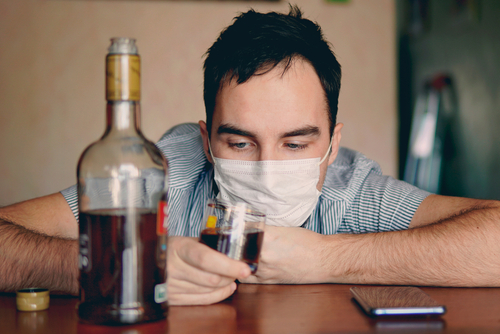Addiction to alcohol is typically referred to as alcoholism or alcohol use disorder. As a central nervous system depressant, alcohol works by slowing down vital functions in one’s body. After an individual consumes alcohol, it is absorbed from the small intestine and stomach into his or her bloodstream and is then metabolized in the liver. The liver, however, is only able to metabolize a small amount of alcohol at a time, which leaves excess alcohol to circulate throughout one’s body via the bloodstream. When a young man habitually abuses alcohol, he will likely build a tolerance to the substance, which requires him to increase alcohol consumption to achieve the same effects. Once an individual develops a tolerance to alcohol, he is at increased risk for developing alcohol use disorder. Alcohol use disorder is listed in the Diagnostic and Statistical Manual of Mental Disorders, Fifth Edition (DSM-5). It is defined as a chronic disease that is characterized by uncontrolled drinking and preoccupation with alcohol. Alcoholics will prioritize satisfying alcohol cravings above all else, regardless of the negative consequences.
Treatment
Detox is the first step of the treatment process an individual struggling with alcohol abuse must complete. It is the process that cleanses one’s body of all foreign substances. Due to some of the more severe withdrawal symptoms that commonly present when detoxing from alcohol abuse, it is advised to undergo a medically supervised detox to ensure safety. After the successful completion of the detox process, there are a variety of treatment options available for a young man recovering from alcohol addiction. With the help of a qualified mental health professional, the unique mental health needs of each person will be considered and used to develop a customized treatment plan. Depending on the needs of the individual, alcohol addiction treatment plans consist of one or more of the following components:
- Cognitive behavioral therapy (CBT): this can help correct irrational, inaccurate, and/ or distorted thoughts as well as help an individual develop skills and healthy coping mechanisms for reducing anxiety and stress while remaining sober.
- Expressive arts therapy (e.g., play therapy, art therapy, music therapy, drama therapy, sand therapy, etc.): provides an alternative medium to express, process and integrate one’s thoughts and feelings surrounding the recovery process.
- Eye movement desensitization and reprocessing therapy (EMDR): utilizes guided eye movement techniques to help process one’s memories, thoughts, and emotional associations in relation to abusing alcohol.
- Dialectical behavior therapy (DBT): is based on the principals of CBT, but places greater emphasis on the psychosocial aspects of treatment. Through DBT individuals can learn healthy coping mechanisms and useful techniques for managing stress, regulating emotions, and improving relationships with others.
Treatment plans can also include improving one’s daily habits (e.g., practicing mindfulness techniques, exercising regularly, developing healthy sleeping habits, eating nutritiously, etc.) to further improve one’s overall health and wellbeing.
Further Information and Support
If you are concerned for yourself or a loved one regarding substance abuse and/ or addiction, we recommend reaching out for help as soon as possible. Addiction can be an incredibly damaging disease. Navigating the challenges that arise from substance abuse, and/ or addiction can not only be all consuming but are often impossible to effectively handle without proper support. If left untreated, substance abuse and/ or addiction can result in long lasting and potentially life-threatening consequences. While seeking help is never easy, it is beneficial to bear in mind that you do not have to be on this journey alone. There is an entire network of professionals that are readily available to help and support you or your loved one throughout every step of the recovery process.
Pathways Recovery is a fully supportive treatment program for those struggling with substance abuse and/ or addiction. We believe in our clients and their ability to turn their lives around. We know that each person who chooses to join our community has the strength it takes to overcome their challenges with substance abuse and/ or addiction. Please do not hesitate to reach out for guidance. We are happy to answer any questions and provide any information you may be looking for regarding substance abuse and/ or addiction. Feel free to contact us by phone at 626-515-6424 or 1-866-682-0901. We look forward to connecting and having the opportunity to discuss how we might best be able to support you.






